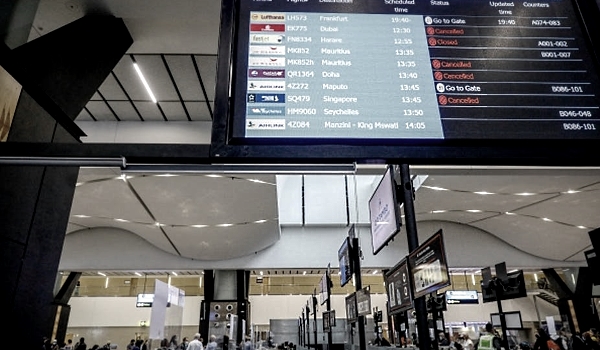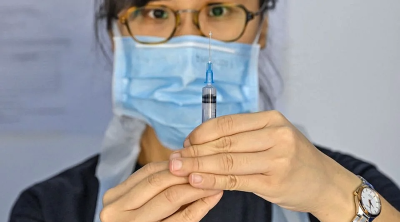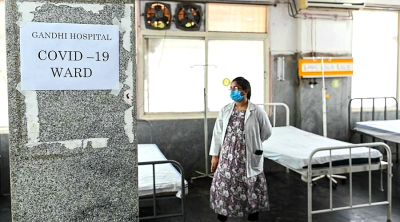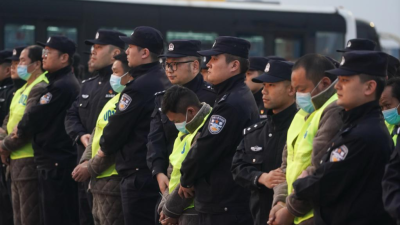Sin Chew Daily
The Vaccinated Travel Lane (VTL) scheme between Malaysia and Singapore officially went into force yesterday, offering a long-awaited chance for businesses, travelers and separated families on bot sides of the Causeway to come together again.
Unfortunately, a new COVID-19 variant, Omicron, has just started to spread rapidly in southern Africa.
As a preventive measure, travelers entering Singapore by land must now undergo rapid antigen tests upon arrival to shut out Omicron.
Epidemiologists worldwide are worried that the Omicron variant will be even more transmissive than Delta and might trigger widespread breakthrough infections across the planet.
Professor Tulio de Oliveira, director of South Africa’s Center for Epidemic Response and Innovation, said the new variant could have mutated from the B.1.1.529 strain in neighboring Botswana, harbors a large number of mutations found in other variants, and is radically different from the original strain which first emerged in Wuhan, China.
This means existing vaccines developed based on the original virus strain may not be effective against the Omicron variant!
China’s Zhong Nanshan has said the world knew every little about the latest variant first appearing in southern Africa on November 11. However, he admitted that the new variant harbors a large number of mutations and may pose tremendous challenges to existing anti-virus efforts. He nevertheless said it is still premature to deduce whether new vaccines have to be developed to fend off the new variant.
 From what we understand, what worries scientists worldwide is the fact that there are 32 mutations in the Omicron variant’s spike protein, with all the characteristics of previously known variants including Alpha, Gamma and Lambda. Mutations of spike protein will boost the virus’ transmissibility while shunning the human body’s defense system.
From what we understand, what worries scientists worldwide is the fact that there are 32 mutations in the Omicron variant’s spike protein, with all the characteristics of previously known variants including Alpha, Gamma and Lambda. Mutations of spike protein will boost the virus’ transmissibility while shunning the human body’s defense system.
Due to the experience we have had in dealing with the rapid spread of the Delta variant globally, epidemiologists are highly concerned about the potential menace of Omicron, even as preliminary studies in South Africa show that Omicron has so far only caused less severe symptoms such as cough, fatigue and muscle pain.
University of Liverpool’s Professor Calum Semple is among the more optimistic experts. He said despite the emergence of new variant, the existing vaccines “are still likely to protect you from severe disease”.
Meanwhile, Professor Xu Jianqing of China’s Fudan University also believes that the possibility of widespread global transmission of the new variant is not high and there are no sufficient data at this juncture for us to make more precise judgments.
During the initial onset of the global pandemic early last year, WHO director-general Dr Tedros Adhanom Ghebreyesus had repeatedly urged the world not to be excessively worried, as COVID-19 would only be an “endemic”. His had judgment denied the world of the golden opportunity to keep the virus at bay. As such, we cannot afford to repeat the same mistake because the new Omicron variant could cause repeat infections in humans due to the 32 mutations of its spike protein.
Although the Omicron variant was first detected only a little over two weeks ago, it has sent a ripple of panic across many countries, including the UK, Germany, Italy, Australia, Hong Kong, South Africa and Israel, where cases involving the new variant have been reported.
US epidemiologist Anthony Fauci has admitted that it’s only a matter of time before the variant is eventually detected in his country.
61 passengers aboard the two recent flights from South Africa to the Netherlands tested positive for the coronavirus at a shocking 15% positivity rate, including 13 cases involving the Omicron variant.
If the above numbers reflect the actual number of infections worldwide, could it be that the total number of infections in our world today should be 1.155 billion instead of just 262 million (a mere 3.4% of the world’s total population) as reported? By comparison, the US has reported a cumulative total of 49.1 million, equivalent to 14.9% of the country’s population. At the height of the pandemic in Malaysia, the peak positivity rate was also around 15%. As such, the transmissivity of the virus could have been much worse than we have imagined!
Many countries have to lift their anti-virus restrictions in hope of reviving their economies and restoring their people’s day-to-day lives, including our VTL with Singapore. Even the UK which was among the earliest to reopen its economy, has now mandated face masks in public. So, we shouldn’t be too upbeat that this whole pandemic thing will be over soon.
Health minister Khairy Jamaluddin has urged Malaysians to continue to adhere to the SOPs while implementing a booster vaccination program. But sadly, there are many irresponsible online critics who have abused the media to post their anti-booster comments to confuse the public.
ADVERTISEMENT
ADVERTISEMENT








































